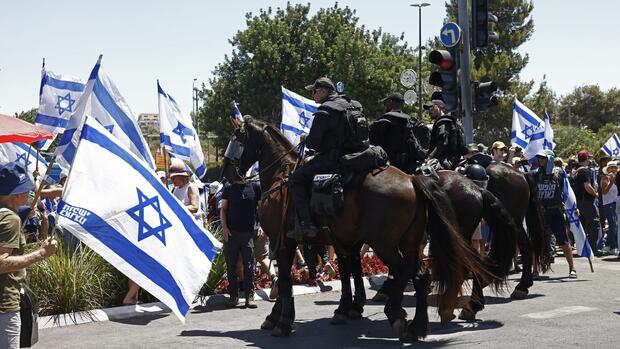The vote is about a passage that would remove the Supreme Court’s ability to overturn the government’s decision as “inappropriate.”
(Photo: Bloomberg)
Jerusalem Despite massive resistance, Israel’s parliament has passed a core element of the controversial judicial reform. After days of debate on Monday, 64 out of 120 MPs voted in favor of a draft law that restricts the Supreme Court’s scope for action.
The opposition boycotted the vote. The law is part of a larger package. Critics speak of a threat to Israel’s democracy.
With the new law, it will no longer be possible for the Supreme Court to assess a decision by the government or individual ministers as “inappropriate”. Critics fear that this will encourage corruption and thus the arbitrary filling of important posts and layoffs. The Netanyahu government, on the other hand, accuses the judiciary of interfering too much in political decisions.
The State of Israel does not have a written constitution and is instead based on a set of fundamental laws. Therefore, the Supreme Court is of particular importance in upholding the rule of law and human rights.
For more than six months, the project has divided large sections of Israeli society. Thousands of people regularly take to the streets against a weakening of the judiciary. Negotiations, even at the last minute, about a compromise were unsuccessful.
Recently, resistance within the military has also increased. More than ten thousand reservists have announced that they will no longer appear on duty if some of the controversial plans are approved. There were also such threats from business and other parts of society.
Netanyahu’s coalition is the most right-wing the country has ever had. The changes in the law are also being made under pressure from Netanyahu’s strictly religious coalition partners. According to experts, however, they could also play into Netanyahu’s hands in a corruption process that has been ongoing against him for some time.
Attempts at mediation by President Herzog were unsuccessful
Attempts to mediate by President Isaac Herzog had previously failed. “With this government, it is impossible to reach agreements that preserve Israeli democracy,” opposition leader Lapid said ahead of a parliamentary vote, according to media reports. According to the draft law, the scope for action of the Supreme Court is to be restricted.
The government wants to “tear apart the state, destroy democracy, destroy Israel’s security, the unity of the people of Israel and our international relations,” Lapid said.
Israel’s far-right police minister, Itamar Ben-Gvir, on the other hand, has condemned last-minute negotiations on a possible compromise on the restructuring of the judiciary. “Any compromise on the adequacy standard would be a disgrace to the entire right wing,” Ben-Gvir said on Twitter on Monday.
He regrets that “parts of the coalition are negotiating with themselves and are seeking a compromise that undermines the law”. Parliament began Monday with what is arguably the crucial vote on limiting the Supreme Court’s powers.
The MPs had met in the Knesset, accompanied by massive protests, to discuss a key part of the judicial reform of Prime Minister Benjamin Netanyahu’s right-wing religious coalition.
Banks, shopping centers and other businesses remained closed as a sign of resistance to the project, and the police used water cannons against demonstrators.
Thousands of Israelis demonstrate in front of the Knesset
During the protests in front of the Israeli parliament Knesset, several demonstrators broke through a police barricade in front of the parliament building in Jerusalem, Israeli media reported on Monday.
Police use water cannons in front of Parliament in Jerusalem
At least five people have reportedly been injured by the use of water cannons and have been hospitalized so far. One person lost consciousness for several minutes.
Police also reportedly used water cannons against peaceful protesters outside the Parliament building. At least 19 people were arrested. Hundreds temporarily blocked access roads to Parliament.
More: Ukrainian tanks run on Russian oil – “Military engines are very tolerant”
